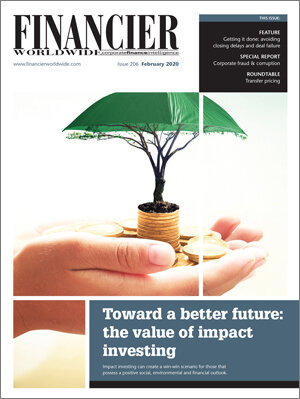Private equity: another banner year in 2019
February 2020 | SPOTLIGHT | PRIVATE EQUITY
Financier Worldwide Magazine
A huge amount of capital flowed through the private equity (PE) industry in 2019. Investors committed more than $500bn to PE funds, which helped push industry assets under management (AUM) to a record $3.8 trillion. PE and venture capital (VC) fund managers in turn deployed over $600bn into deal opportunities. Those that exited their holdings through the year returned $309bn to investors, on course to set an annual record.
On its own terms, then, the year was an unequivocal success. The PE industry has benefited from a persistent low interest rate environment, strong GDP growth in many developed markets and a booming appetite for private investing in emerging economies. But a majority of investors and fund managers believe that equity markets are at a peak, and that a correction is due. And 2019 saw no abatement in the challenges engendered by fierce competition, high asset pricing and increased stratification.
Operating in the market was more challenging than ever in 2019. Capital concentration reached record levels: 45 percent of all committed capital went to the 20 largest funds, which is a long way from the 29 percent that the equivalent group accounted for five years ago. Competition was also fierce – both in sourcing companies and attracting capital. Seventy-seven percent of fund managers reported that competition for investor capital increased over 2019, while 44 percent experienced more competition for transactions. Investors sought the perceived safety of brand name funds, even as rising demand for PE continued to attract new participants. And as investors prepare for a possible market correction, this demand is likely to increase yet further.
As a result, we have seen capital pile up faster than fund managers can use it. PE fund managers held $1.45 trillion in dry powder as of the end of 2019, an increase of more than $100bn across the year. This has caused some concern among investors: with so much capital waiting to be put to work, it is simultaneously depressing long-term performance, and exacerbating short-term competition and pricing issues. With so much available capital bidding on assets, fund managers are either forced to accept higher pricing multiples or save their powder and find alternative opportunities. It is a vicious cycle that has been intensifying for years, but there does not seem to be a simple solution for the industry.
Recent strong returns have helped to allay some of these concerns and maintain investor confidence over the year. Among those surveyed, 87 percent of investors said the performance of their PE portfolios met or exceeded expectations in 2019. Capital distributions also reached a record $542bn for 2018, while a further $309bn was distributed in H1 2019.
Although PE is crucial for return generation in an investor’s portfolio, the value it can provide goes beyond returns. The private fund model served to protect capital through the global financial crisis (GFC), with vintage 2006-2008 funds now producing positive net internal rate of returns (IRRs). And these strong returns look set to continue, with nearly four in five (79 percent) of investors expecting performance to improve or be at the same level in 2020 as last year.
Buoyed by the performance they are seeing, 51 percent of surveyed investors intend to increase their allocation to PE over the long term. What is more, in response to their belief that equity markets are at a peak, almost a third plan to increase their allocation to private markets, while 64 percent will maintain their allocation. With such strong investor confidence, fund managers stand ready to put more capital to work, with 58 percent of surveyed general partners (GPs) stating that they will invest more capital in 2020 than they did in 2019.
Whether by adjusting strategies, upgrading internal processes or sourcing investor capital, many fund managers are evolving. One-third of those surveyed are adapting their strategies in response to the cycle, and many are looking to defensive and cyclically resistant sectors in 2020. Longer-hold strategies and an emphasis on value creation are also more prevalent in the market, with add-on activity reaching record levels in 2019.
Demand for artificial intelligence (AI) investments is rising exponentially as fund managers and investors not only look to the sector for returns, but also for solutions relevant to their own operations. Environmental, social and governance (ESG) investing is an ever-greater priority in the asset class: 46 percent of investors have an ESG policy in place, and 35 percent have turned down an opportunity to invest in a fund due to ESG factors.
PE has witnessed unprecedented demand since the 2008 GFC, owing in part to the strong performance of the asset class in the intervening decade. While geopolitical tension, rising valuations and macroeconomic uncertainty continue to present challenges for the industry, investors are still confident of strong performance. Fund managers’ ability to deliver returns throughout cycles looks set to increase the demand for and value of a private equity allocation in the near future.
Christopher Beales is a private equity analyst at Preqin. He can be contacted on +44 (0)20 3207 0231 or by email: christopher.beales@preqin.com.
© Financier Worldwide
BY
Christopher Beales
Preqin

